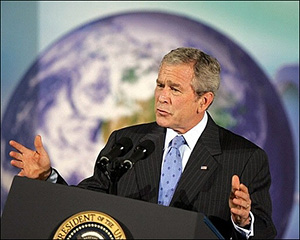 |
 |
 |
 Editorials | Environmental | September 2007 Editorials | Environmental | September 2007  
Bush Warns Climate Change Fight Must Not Slow Growth
 Agence France-Presse Agence France-Presse
go to original


| | US President George W. Bush speaks at the Major Economies Meeting on Energy Security and Climate Change at the State Department in Washington, DC. Bush went on the offensive on climate change Friday, proposing a summit next year among major emitters of greenhouse gases that would set a long-term global goal for curbing this dangerous pollution. (AFP/Tim Sloan) |
US President George W. Bush warned Friday that the fight against climate change must not impede economic growth in a closely-watched speech to the world's 16 biggest greenhouse-gas polluters.

"Our guiding principle is clear. We must lead the world to produce fewer greenhouse gas emissions and we must do it in a way that does not undermine economic growth or prevent nations from delivering greater prosperity for their people," Bush said.

"We know this can be done. Last year America grew our economy, while also reducing greenhouse gases," he maintained.

Bush's comments will be closely scrutinized for any sign of a change of direction in US policy, after isolating himself for six years from the global task force for reducing greenhouse-gas emissions.

"Today's meeting is an important step," Bush said Friday.

"With the work we begin today we can agree on a new approach that will reduce greenhouse gas emissions, strengthen energy security, encourage economic growth and sustainable development and advance negotiations under the United Nations framework convention on climate change."

Experts remain wary about whether Bush is really committed to cutting greenhouse gases in the energy-guzzling United States, which is the world's number one polluter.

"I think that we all want to hear (from Bush) a very strong commitment to tackle climate change, not just through voluntary action or vague references... but quantifiable measures, verifiable results," Mexican delegate Fernando Tudela told journalists.

Carbon pollution, mainly derived from burning fossil fuels, traps solar heat in the atmosphere and is slowly heating Earth's surface, wreaking the first of what could be dramatic changes to the climate system.

On Thursday, US Secretary of State Condoleezza Rice spelt out a warning on climate change that was exceptionally blunt for a Bush administration official, called for international cooperation against the threat and pledged US commitment to work under the UN.

"This test has much in common with the other great challenges that are defining this young century -- from weapons proliferation, to the spread of disease, to transnational terrorism," she said.

"These are truly global problems and no one nation, no matter how much power or political will it possesses, can succeed alone. We all need partners, and we all need to work in concert."

Rice's words coaxed a positive response among defenders of the Kyoto Protocol, the landmark UN emissions-cutting accord that was nearly wrecked after it was abandoned in 2001 by Bush.

European diplomats welcomed it as a long-awaited attempt to build a bridge by the world's No. 1 carbon polluter.

But they also remain wary about any US attempt to parlay the Washington initiative into a narrow, unambitious alternative to the UN process, which is slower and cumbersome but more demanding in its curbs.

"Our view is that Bali is the landmark that we must all look at," said Portuguese Deputy Environment Minister Humberto Rosa, whose country is current president of the European Union.

Key talks take place under the UN in Bali, Indonesia, in December on how to deepen emissions cuts when the treaty's current commitments expires at the end of 2012.

The 16 nations gathered in Washington are Australia, Britain, Brazil, Canada, China, France, Germany, India, Indonesia, Italy, Japan, South Korea, Mexico, Russia, South Africa and the United States.

Together they account for about two-thirds of the world's population, 80 percent of the global economy and about 80 percent of global emissions, according to US figures. Representatives from the EU presidency and Commission and from the UNFCCC are also there.

The talks were to wrap up on Friday with what US diplomats hope will be an agreement on a broad agenda for a series of talks throughout 2008.

The proposed scope is for setting national emissions targets as well as a possible long-term global emissions goal, and for initiatives that will encourage businesses and cleaner technology. | 
 | |
 |



